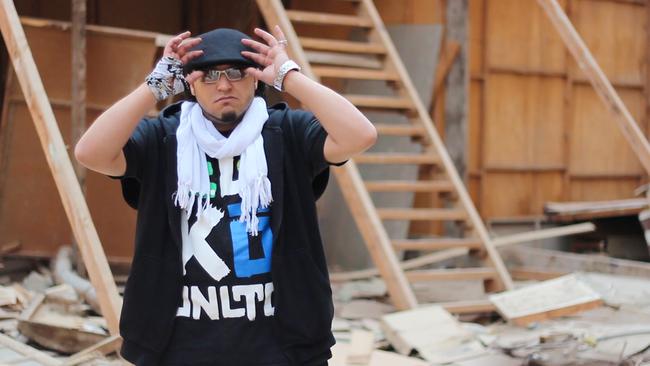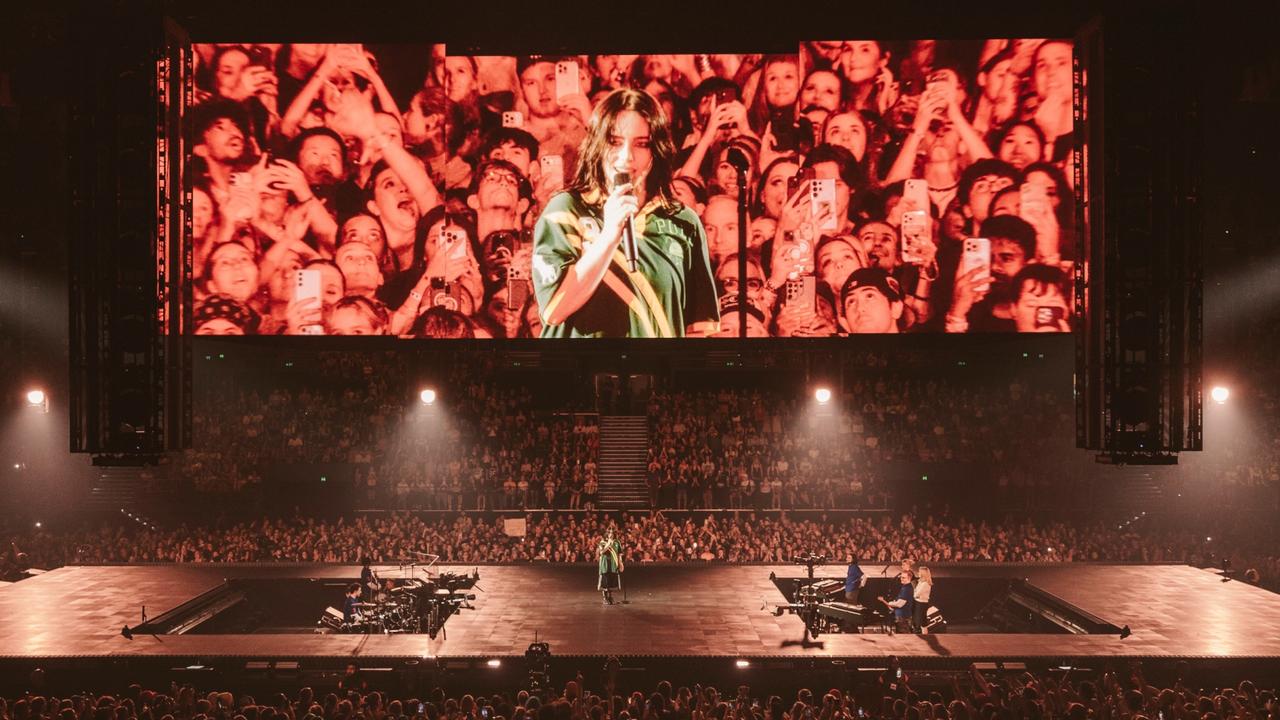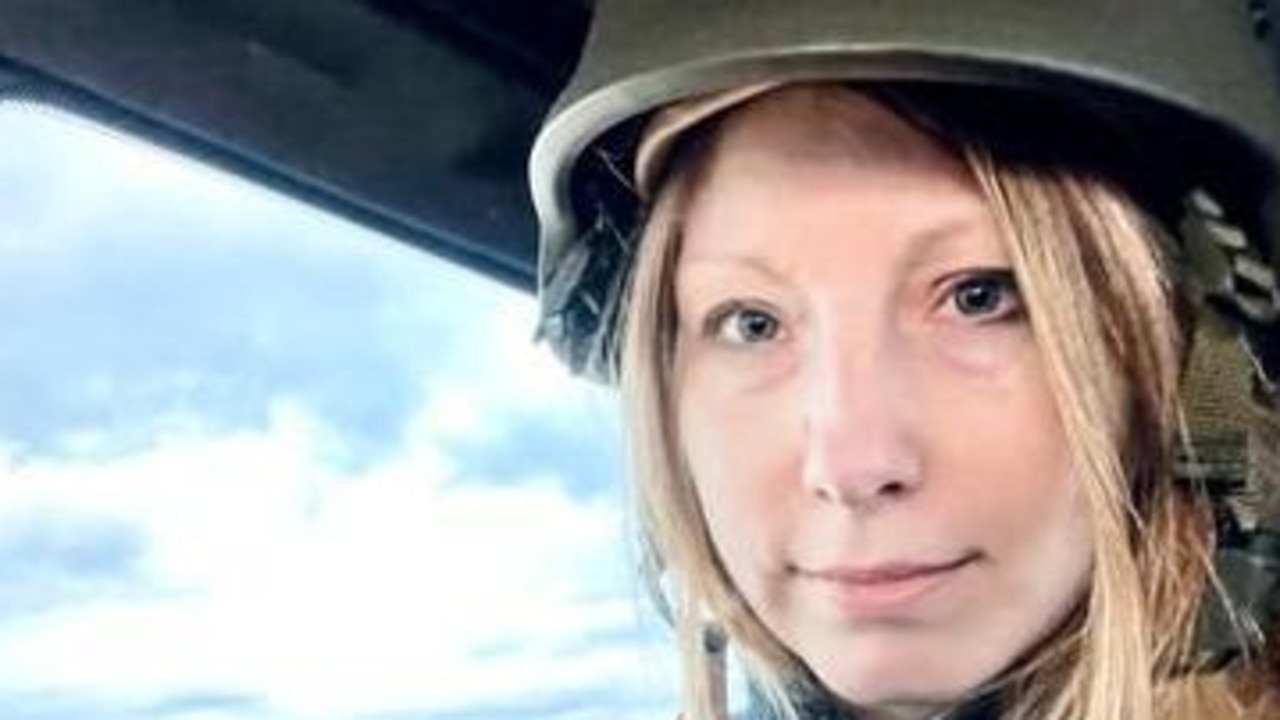Syrian refugee hip-hop artist Murder Eyez finds his voice in Germany
Syrian hip-hop performer Murder Eyez struggled to find his groove after fleeing to Europe.

It begins with a disturbingly wonted montage: a bomb condemning a building to ash and memory. Then, emerging from the rubble and billowing cinders, the methodical exodus of the dispossessed begins — each solemn face rendered with the vacant gaze of an Edvard Munch sketch. Then the beat snaps in, like buckshot. An Arabian ney wavers enigmatically, finally surging to a discordant crescendo. The screen shudders violently, as if reeling from mortar fire: “The gates of hell have opened up,” the rapper spits caustically in Arabic to a backdrop of freshly smoking romanesque ruins, coupled with a barrage of textbook hip-hop hand gestures. “The laughter of the children is dead.”
Abdul Rahman Masri — better known by the somewhat sinister musical nom de guerre Murder Eyez — is both Syria’s progenitor and reigning maven of hip hop. At least he was until the beats were muffled by mortar fire. “There comes a point you gotta stop and just run for your life,” he says, starring deep into his coffee cup. “You ask yourself, ‘What’s the point of all this? What’s the point of music? Am I willing to die for it? Or is it worth staying alive for?’ ”
Until the war arrived on his doorstep (and through his roof) Masri was a seemingly tenacious force in Syrian cultural life — the son of a government clerk who had built up a modest empire that spanned a record label and studio (Big Change Recordz), plus a couple of fashion stores in his hometown of Aleppo. “Life was good,” he explains. “I had it all. And now I got nothing … just a few euro in my pocket.”
Briefly imprisoned twice earlier in his career for proselytising “the devil’s music”, Masri learned to keep his ruffian alter ego in check and his flows clean, and was soon embraced as the soundtrack of contemporary Syria. In 2010 Murder Eyez even went on to become a pan-Arabian star, appearing in the somewhat salubrious Middle Eastern television talent quest House of Hip-Hop — finishing third as the tinder of the Arab Spring began to smoulder in Tunisia. In the words of another Syrian asylum-seeker I meet at a gig in Berlin: “He was Jay Z in a keffiyeh,”
The Syrian civil war came late to Aleppo, but when it finally arrived in July 2012 it showed no mercy — as though the seven-headed serpent slain by Ninurta in Sumerian mythology had returned to settle the score once and for all. The war had by then disintegrated into a Faustian inferno of creed, tribe, power and retribution, pitched between the government of President Bashar al-Assad, the Free Syrian Army, Hezbollah, Islamic State, al-Nusra and a ragtag assortment of Sunni and Shia militias — and their international paymasters. No one was safe.
Today there is scant left of the fabled Levantine city, renowned for its elaborate poetic and musical tradition known as Qudud Halabiya — a folk form Murder Eyez borrows heavily from, mashed up with swaths of South Bronx brouhaha. “I was in the recording studio,” Masri remembers of what the history books now refer to as the cataclysmic Battle of Aleppo.
“I almost lived in the recording studio in those days. We would record all night and then go out until dawn and then record again. My mum used to call just to check I was alive, as I never came home. But then one day she called saying, ‘Don’t come home — the war is here.’ I could hear the shelling in the background down the phone, like a Bruce Willis action movie, you know?” He laughs nervously at his analogy and then wipes the smile from his face. “And that was it — we started running and never stopped.”
Masri’s flight took him to Dubai, Turkey, Egypt, Italy and finally Germany, where he arrived in early 2013. He implores that the details of his traumatic journey from Egypt to Italy not be printed: “It was beyond hell, man, that’s all that needs to be said.” From Italy he set out overland for Sweden (“I’d been told we had a good chance to work there”) but was stopped by police while travelling on a local bus near the northeastern German city of Rostock.
Granted political asylum, his next two years in Rostock would prove excruciatingly silent: “I couldn’t find my power within,” Masri explains of his time in the gritty port city, which was the central stage for Germany’s 1992 anti-immigrant riots.
“I’d lost my home. I’d lost family and friends. I was depressed and alone. I lost my voice.”
Masri is a staggering statistic: one of the more than nearly 2.5 million refugees who have sought asylum in the EU in the past three years, the largest proportion in Germany. In 2013 the country officially overtook the US in refugee applications — fuelled by the Syrian exodus — eventually prompting Chancellor Angela Merkel last year to temporarily waive the Dublin Regulation and effectively open the country’s doors to more than one million asylum-seekers, largely from war-torn Middle Eastern and African nations. It would prove an act of mass compassion that, while wounding her domestically with the rise of the anti-immigrant Alternative for Germany party in recent state elections, has nonetheless rewired the country’s cultural landscape for good.
I meet 34-year-old Masri at a cafe in central Cologne — his home since late last year, and the city where he hopes to rebuild his life and career. He barely resembles the intimidating character in the press photographs — a stocky and unassuming man, constantly and needlessly apologising for both his nostalgic anecdotes of life in Aleppo (“There was no city like it anywhere in the world”) and his English (“I learnt it from Ice Cube”).
In January he released his first Murder Eyez single in years, Syrian Speech — a vitriolic riposte denouncing Arab leaders and international agents with self-serving agendas in Syria: “They are all trading our souls,” he admonishes in the accompanying video, which has already been viewed nearly 80,000 times.
With the ominous brume of the Holocaust still lingering over Germany, many consider the country’s new-found altruism to be partial penance for its historic sins — atrocities that not only saw millions murdered but also drained Europe of a substantial proportion of its cultural elite. Among those who fled for less hostile territory were future Archibald winner Judy Cassab and iconoclastic Australian-German photographer Helmut Newton — plus the ancestors of many of Australia’s leading performers and arts practitioners, including David Malouf, Renee Geyer, Barrie Kosky and David Helfgott.
Cologne-based music publisher Silke Volgmann believes Germany is set to experience a similar cultural boon.
“These are civilised, intelligent and cultured people,” she declares excitedly of her new countrymen and women. “Look at Palmyra — one of the great cultural centres of any civilisation. She points directly at Masri: “This is the new sound of Germany, whether we like it or not. You can’t honestly expect these people to come here and just stay silent. They have stories to tell, and they are now our stories also. Germany will be better for it.”
And indeed they are not staying silent. Be it through the conciliatory Teutonic medium of classical music, as with the Bremen-based Syrian Expat Philharmonic Orchestra, or the jocose rants of the country’s inaugural refugee YouTube star Firas Alshater — whose amateur, frivolous and often profound videos about life in his adopted homeland have been viewed millions of times — these voices have unequivocally joined the wider national chorus.
This cultural melee — or what some conservative commentators prefer to term “dilution” — has prompted unease at even the highest levels of government, with a new draft law proposing the deportation of otherwise legal refugees who fail to properly integrate. Vice-Chancellor Sigmar Gabriel has since come out in support of the draft bill, telling the tabloid daily Bild: “We must not only support integration but demand it.”
Integration is a word that sits uneasily with Madjid Mohit, an award-winning book publisher based in the charmed Hanseatic German city of Bremen. “What does it mean,” he asks with an impudent smirk. “That we must only eat ice cream in the summer? How boring!” Once a burgeoning publisher in Iran — having inherited the trade from his father and grandfather — he found himself on the wrong side of the regime in 1982 for daring to publish One Hundred Years of Solitude in Persian.
“They called it pornographic … dangerous,” he wryly says of Gabriel Garcia Marquez’s 1967 novel, speaking in his central office, where the constant drizzle outside obscures Bremen’s gothic skyline. “Can you imagine? They came in and took every last copy — burnt them, I guess. They took everything; every last scrap of paper.”
Although brutally truncated, his Iranian bibliography reads — in its political, social and historical context — like a fatalistic provocation: George Orwell’s Animal Farm, Henry Miller’s The Smile at the Foot of the Ladder, Bernard Malamud’s The Fixer and Charles Berlitz’s Mysteries from Forgotten Worlds.
“I am no hero,” Mohit says, flaying his hand in contempt at the suggestion, sitting beneath a portrait of a semi-naked woman. “I did it for the words, nothing else. But it meant I had to leave if I wanted to live. And I did want to live — I had too much work to do.”
Mohit’s futile attempt to get to Canada on a fake passport in 1990 saw him detained en route in Frankfurt, and he was unexpectedly granted political asylum in Germany — a country about which he knew little beyond the Nazi cliches. “My first years here were traumatic,” he recollects in a softening tenor. “I was in a depressed state, and it was not a really good time for me. I spoke no German. I had no future: that was the big question that disturbed me at the time. I was like a poet with no words left.”
In November 2015 Mohit accepted the German PEN Centre’s Hermann-Kesten Prize — an award honouring the outstanding contribution of a persecuted artist to German cultural life; previous recipients include Gunter Grass, Harold Pinter, Anna Politkovskaya and Liu Xiaobo. In 1996 Mohit founded Sujet Verlag, a publishing house specialising in contemporary Persian works forbidden in Iran, as well as mutual translations of German and Persian texts. “It’s a dialogue,” he says of the translations. “We each have something unique to offer the other. No one culture has all knowledge.”
On accepting the Hermann-Kesten Prize, and considering his “lost” and “depressed” first years in Germany, he mused that the thing he needed more than anything from his new countrymen back then was patience. “Without patience nothing is possible,” he adds today, sipping on a cup of instant coffee.
“I see me in these [recent refugees]. These are our future artists and writers and thinkers. It can happen,” he adds, pointing to his award on the shelf. “History has proven that. Like a great poem, all they need is time. Freedom is art, and art is freedom.”
Back in Cologne, Turkish-born Kurdish painter and art therapist Hasan Huseyin Deveci considers a series of somewhat crude paintings — clearly the work of children.
However, beyond the telltale kaleidoscopic palette and predilection for drawing flying machines, these are no ordinary puerile scribbles: they are harrowing first-hand accounts of war as seen through through once-innocent eyes.
Himself a refugee who arrived in Germany in 1994, Deveci — who paints under his Kurdish family name, Malmime — responded to the largest migration of people since World War II the only way he knew: with paint and canvas. Since 2014 he has regularly opened his studio to Syrian refugees aged eight to 14 and encouraged them to paint as a way of both escape and expression, and as a means of communicating with their fellow Germans.
However, many resort to all-too-familiar themes: bombs, fire and death.
“As an artist, I am convinced that art can make a decisive contribution to help cope with traumatic experiences,” Deveci says.
“Art shows life from the inside out. Also, art requires no language — it is universal. Most of these children cannot speak German. For them the art is their language.”
Across the churning Rhine River in Cologne’s cobbled old town, Murder Eyez lights a cigarette and inhales deeply. Despite the gnawing cold, young folk are out on the streets downing bottles of the city’s famed Kolsch beer beneath faded posters promoting the annual gay and lesbian Christmas market. Despite the obvious moral confutations with his Muslim faith — including a now notorious Facebook post from last year lambasting same-sex marriage, for which he later apologised — Masri says he has finally started receiving calls from German promoters.
“It’s happening,” he grins widely. “I don’t know what’s coming, but I’m gonna make sure it’s good.”
Nearby the medieval cathedral’s bells toll steadily — an austere reminder of the mass sexual assault that took place at the nearby square on New Year’s Eve, which, along with the recent Paris and Belgium terrorist attacks, has only exacerbated the brewing xenophobia peddled by nationalistic organisations such as Pegida and AfD.
“We are good people,” Masri implores. “But we must work hard, and prove ourselves. We owe it to ourselves and to Germany. We need our dignity back.”
He stubs his cigarette out beneath a boot and suddenly removes his phone from his jacket. “I’ve got to show you something,” he says eagerly, firing up his ringtone. The unmistakable trumpet waltz from The Godfather blares out. “In Syria I was known as The Godfather,” he says, straightening his fleece jacket and pulling his beanie down low across his eyes. “Loyal and strong! So much has changed, but some things are unchangeable.”


